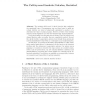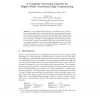136 search results - page 3 / 28 » Proving Properties of Lazy Functional Programs with Sparkle |
135
Voted
ICFP
1999
ACM
15 years 4 months ago
1999
ACM
Functional logic languages combine the operational principles of the most important declarative programming paradigms, namely functional and logic programming. Inductively sequent...
ESOP
2012
Springer
13 years 8 months ago
2012
Springer
The existing call-by-need λ calculi describe lazy evaluation via equational logics. A programmer can use these logics to safely ascertain whether one term is behaviorally equivale...
94
Voted
SAS
2010
Springer
14 years 11 months ago
2010
Springer
We propose lazy propagation as a technique for flow- and context-sensitive interprocedural analysis of programs with objects and first-class functions where transfer functions ma...
103
Voted
IFL
1997
Springer
15 years 4 months ago
1997
Springer
Common subexpression elimination is a well-known compiler optimisation that saves time by avoiding the repetition of the same computation. In lazy functional languages, referential...
127
click to vote
PLILP
1995
Springer
15 years 4 months ago
1995
Springer
Abstract. Using higher-order functions is standard practice in functional programming, but most functional logic programming languages that have been described in the literature la...


